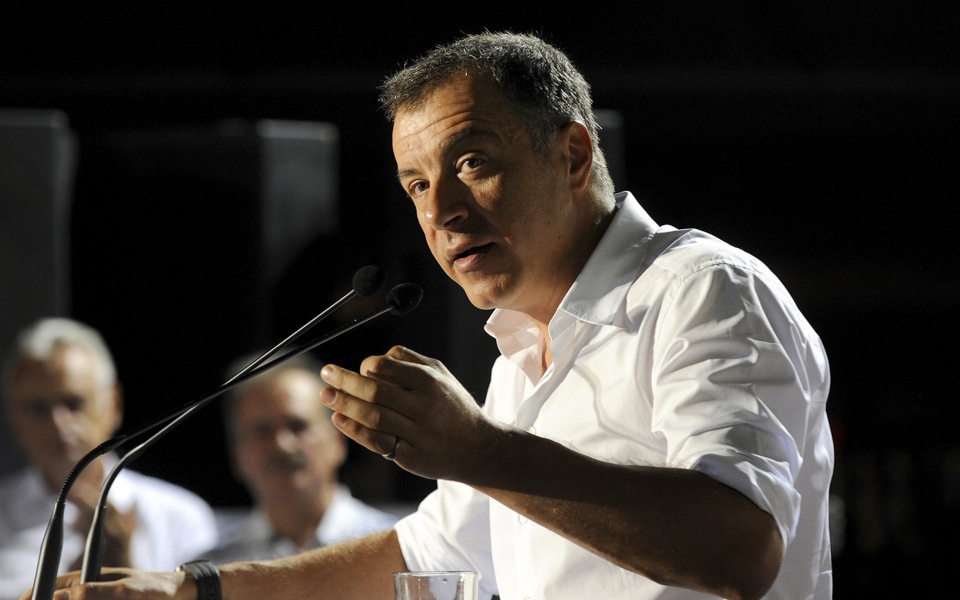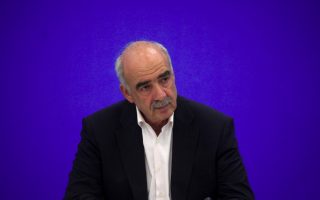Theodorakis open to pact even with ‘the devil’ for stability’s sake

Greek centrist Stavros Theodorakis says his small Potami party is willing to strike a pact with leftists, conservatives or even “the devil” if needed to save the country from yet another round of elections after it votes later this month.
Opinion polls show the leftist SYRIZA party and conservative New Democracy neck-and-neck before the elections on Sept. 20 – suggesting no outright winner will emerge and sending Greeks back to the ballot box for a third time this year, unless a coalition is cobbled together.
Alexis Tsipras forced the election last month by resigning as prime minister after only seven months in office, hoping to end a rebellion in his SYRIZA ranks and win an outright majority. But SYRIZA's support has fallen sharply since Tsipras ditched many of the promises he made before winning power in January, to secure a new bailout deal for Greece.
Now Potami hopes to play a role as a pro-euro ally for either SYRIZA or New Democracy, and avoid a repeat of 2012 when two parliamentary elections had to be held in successive months.
At Potami's Athens headquarters, Theodorakis told Reuters that he was open to teaming up with either party and that Greece, mired in seven years of crisis, could not afford to wait around for a single-party government to be elected.
“Greek people have reached their limits, the economy has stagnated, inequalities are growing. We can no longer experiment and wait for one of us to win outright. We must find a way to cooperate and produce results, a strong government,” said the 52-year-old former journalist.
“We will do everything. We will even ally with the devil as long as the Greek people's problem is resolved.”
Founded last year, Potami or “River” – meant to reflect a hope of washing away the wrongs that brought the country to the brink of bankruptcy – strongly favours Greece staying in the euro.
It made a splash in the January election, buoyed by a youthful, non-mainstream appeal and its status as a new force untainted by ties to the political establishment. It entered parliament with 17 members of the 300-seat house and has since voted in favour of the unpopular 86 billion euro ($96 billion)bailout programme to keep Greece in the euro.
Its fortunes have since waned, with pollsters saying Potami is no longer considered a “new” party and is losing support to SYRIZA, which is seeking centre-left voters since making its U-turn and accepting the eurozone's tough bailout terms.
Still, polls show Potami taking between 4 to 7 percent of the vote and fighting for third place with the far-right Golden Dawn and Socialist PASOK parties, meaning it could play a crucial role if the election winner needs a coalition partner.
SYRIZA has ruled out an alliance with anyone other than its former coalition partner, the right-wing Independent Greeks.
However, it agrees Greece cannot afford yet another round of elections, suggesting it will face pressure to consider a tie-up if the Independent Greeks fail to enter parliament, as polls indicate.
Theodorakis said Potami would reject cooperation only with parties holding “extreme views” – all Greek parties refuse to deal with Golden Dawn – and warned that its participation in a coalition would not be unconditional.
“We won't attend the discussions with blank documents. We have specific proposals and priorities,” he said. Cracking down on corruption, creating jobs at a time of 25 percent unemployment and reforming education were among Potami's priorities, he said.
With hot issues such as a bailout review by European and International Monetary Fund creditors, sweeping pension reform and talks on possible debt relief, Theodorakis called for a national negotiating team to be set up.
“Europe is changing,” said Theodorakis. “The bailout which has been agreed with the Europeans must be respected but also improved in the favour of Greeks.”
Even while in opposition, Theodorakis has tried to stay involved in talks with European officials – he met European Commission President Jean-Claude Juncker in July, a few days before Tsipras clinched the bailout deal.
“The government negotiated in haste, without a plan and made many mistakes. We can convince Europeans that the changes we suggest are better for the people, the economy and for growth,” he said. “There is room for small surgical moves which will restore injustices.”
[Reuters]





